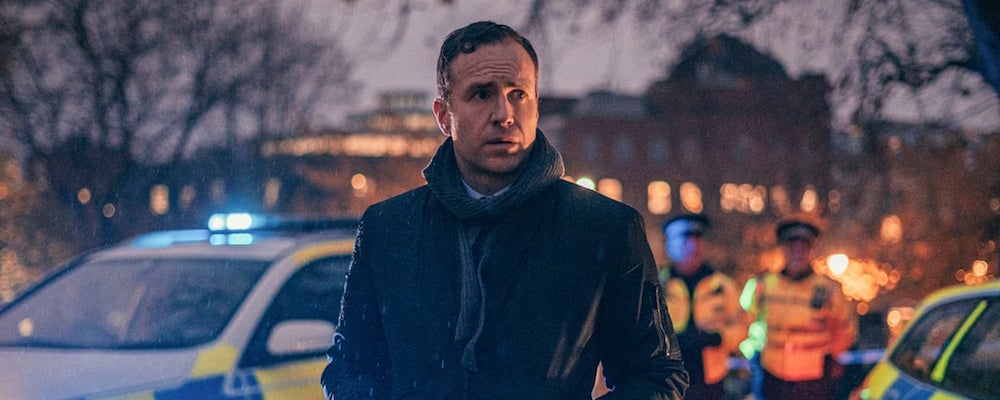‘The Salisbury Poisonings’ Skips the Politics to Focus on the Everyday Players in a Detective Story
Tony Sokol
“The Salisbury Poisonings” opens like a political “Andromeda Strain.” A beast from the east hit the west in 2018. The series dramatizes a real event that began in March of that year when a former Russian soldier turned British spy and his daughter were poisoned with synthetic nerve agent Novichok, which is the Russian word for “newcomer” and one of the deadliest substances on Earth. Just a spoonful of the stuff could kill tens of thousands of people. The British government accused Russia of attempted murder. Three months later a perfume bottle containing that chemical was found in three, seemingly unrelated cases. The four-part docudrama is relevant amidst the chaos of the Coronavirus pandemic, and looks to showcase commonplace heroics.
The poisonings caused an unprecedented public health crisis, which the series uses to tell a medical detective story. Sgt. Tracey Holloway (Natalie Klamar) finds Sergei Skripal (Wayne Swann) and his daughter Yulia slumped on a park bench in a shopping center hours after flying in from Russia. It appears to be an overdose but the policewoman who arrives on the scene first and calls in CID says “it just feels a bit off” to Detective Sergeant Nick Bailey (Rafe Spall). Adam Patterson and Declan Lawn’s screenplay downplays military-grade research facilities and armed response.
While the laboratories at Porton Down try to determine what the as-yet-unknown toxin is, Wiltshire’s Director of Public Health, Tracy Daszkiewicz (Anne-Marie Duff), comes up with a system to track and trace people who might have come into contact with the poison. Just finishing up work on the “beast from the east” snowstorm which slowed the area to a stop, Daszkiewicz now has to close it again to contain the risk of spread. She orders containment zones, the temporary shutting of businesses, and has to calm the public. This is a far cry from food poisoning outbreaks and Anne-Marie Duff brings warmth to her determined public servant. She also brings a believable weariness, with a kid at home demanding attention.
“The Salisbury Poisonings” builds slowly, to match the actual events, and uses archival news footage as an ongoing timeline. The political story also plays out through archival TV and radio news clips. The incident is deemed a chemical attack by a foreign power on British soil. Sergei, was a double agent with Russia’s Main Intelligence Directorate and the Secret Intelligence Service of the U.K, where he’s lived since a spy swap program in 2010. Ross Cassidy (Mark Addy), one of the dead spy’s friends, reveals Sergei suspected President Putin ordered his execution but we have no clue why he would commit a war crime to do it. The show doesn’t explore the investigation or the conspiracy. International intrigue is not the focus of “The Salisbury Poisonings.” It focuses on the personal stories of the local victims.
Nick Bailey (Rafe Spall), the police officer who went into Skripal’s house after the attack, comes down with symptoms which play out right quickly. Dawn Sturgess (MyAnna Buring) and Charlie Rowley (Johnny Harris) are found poisoned by the Novichok nerve agent seven miles away in Amesbury, where the vial was tossed after the assassination attempt. Sturgess would be the only fatality of the attack. Even though they are not poisoned until months after the initial poisonings, we follow Sturgess and Rowley from the beginning. Sturgess is a recovering alcoholic trying to do well by her daughter. Charlie gives Dawn the fancy-looking perfume which turns out to be the chemical weapon delivery system.
“The Salisbury Poisonings” is emotionally effective but procedural. We are introduced to the families, get a sense of their day to day lives. There are a lot of characters and the show balances it well. Then we get the event, which pulls everyone into it. It is calmly and competently dealt with by sympathetic everyday heroes who ultimately accept a new normal. It is almost absurd, when compared to most nations’ responses to the Coronavirus. Directed by Saul Dibb, the four-part limited series keeps your attention consistently, and not just because it’s come out during an extended lockdown. “The Salisbury Poisonings” completed shooting before all productions ground to a halt and altered reality. It is the hopeful prelude to the cautionary tale which followed.
“The Salisbury Poisonings” begins streaming Oct. 1 on AMC+.

